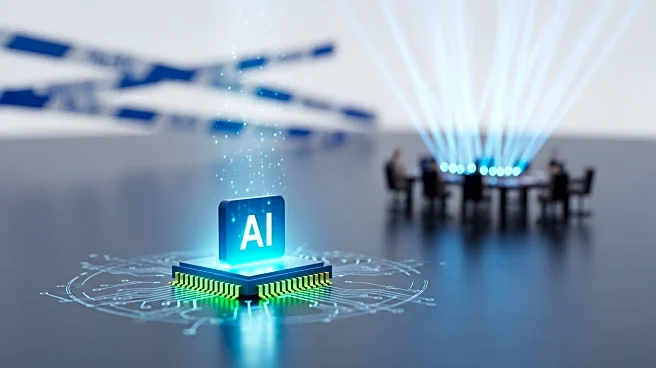What's Happening?
Tesla is advancing its artificial intelligence capabilities with the development of its AI5 chip, which will be manufactured by Samsung in Texas and TSMC in Arizona. CEO Elon Musk revealed this during
Tesla's third-quarter earnings call, emphasizing the company's goal of achieving 'excess production' of these chips. While Tesla previously used Nvidia's Drive chips, it has since transitioned to its own processors but continues to utilize Nvidia's graphics processing units for training its models. Musk clarified that Tesla is not aiming to replace Nvidia but rather to complement its technology. The AI5 chip, first announced in 2024, is part of Tesla's Autopilot hardware, designed to enhance self-driving features. The chip will be produced at U.S. facilities and is half the size of full reticle AI chip designs from Nvidia and AMD.
Why It's Important?
Tesla's development of the AI5 chip signifies a strategic move to bolster its self-driving technology and data center capabilities. By manufacturing these chips domestically, Tesla is aligning with broader industry trends of increasing U.S. semiconductor production. This development could enhance Tesla's competitive edge in the electric vehicle market, particularly in autonomous driving technology. The collaboration with Samsung and TSMC also highlights Tesla's commitment to leveraging advanced manufacturing capabilities. The continued use of Nvidia's GPUs indicates a balanced approach, ensuring robust AI model training while expanding proprietary technology. This strategy may influence other automakers and tech companies to pursue similar paths in AI chip development.
What's Next?
Tesla's AI5 chip production is expected to ramp up, with potential implications for its self-driving technology and data center operations. The company's strategy may prompt reactions from competitors and partners in the semiconductor industry, possibly leading to new collaborations or innovations. As Tesla continues to refine its AI capabilities, stakeholders will be watching for advancements in its Autopilot system and any updates on the successor AI6 chip. The broader impact on the U.S. semiconductor landscape could include increased investment in domestic manufacturing and technology development.
Beyond the Headlines
Tesla's AI5 chip development raises questions about the ethical and legal dimensions of autonomous driving technology. As self-driving features become more advanced, regulatory bodies may need to address safety standards and liability issues. The integration of AI in vehicles also touches on privacy concerns, as data collection and processing become more sophisticated. Long-term, Tesla's approach could influence cultural perceptions of AI and automation, potentially reshaping consumer expectations and industry standards.










